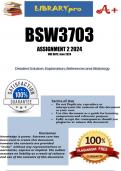BSW3703
ASSIGNMENT 2 2024
DUE DATE: June 2024
, BSW3703/101/0/2024
Assignment 2 2024
COMMUNITY WORK: THEORIES
APPROACHES AND MODELS
BSW3703
Year Module
Department of Social Work
This tutorial letter contains important information about your module.
BARCODE
, BSW3703/101/0/2024
TOTAL: 100
9.5.2 Assignment 02
Length
The assignment should consist of about 15–20 pages (including the table of contents and
bibliography). The length is important, because this assignment is also an exercise in learning to
condense and integrate material from different sources into a meaningful whole. You will probably
need to rewrite the assignment a few times to meet this requirement succeed in limiting the length
while also covering the topic properly.
Use the knowledge and understanding you have gained and critically reflect on the
following case study:
CASE STUDY 1: DEVELOPMENT OF THE IKAGENG WITKOPPEN PRE-PRIMARY SCHOOL
This case study was facilitated by a Unisa student.
BACKGROUND
The opening of the Ikageng Witkoppen Pre-Primary School in January 1994 was the culmination
of a participatory, grassroots, micro development process that started in April 1993 and reached
the implementation stage just before the dawn of democracy in South Africa in 1994.
Witkoppen is an affluent, white residential area of smallholdings north-west of the greater
Johannesburg area, in the district of Sandton. Witkoppen has a flourishing business community.
Large numbers of mainly black people are employed as domestic workers and farm labourers.
These employees are socially and economically disadvantaged. The accommodation, education
and recreation of these labourers have not been given a high priority and few facilities were
developed in the past. The migrant labour situation meant that families were split up, and a high
percentage of the children growing up in this area come from single-parent families.
Accommodation for these families is minimal and there is overcrowding, a lack of privacy and little
transport. These difficult conditions resulted in far-reaching social problems such as alcoholism,
prostitution, teenage pregnancy, and child neglect.
During the years when schooling was racially segregated, the Witkoppen School developed as a
farm school catering for the children of domestic workers and farm labourers as well as children
from squatter camps in the area. Most of the children came from a socially and economically
impoverished background. In the school situation, this manifested itself in behavioural problems,
an inability to concentrate, tiredness, hunger, and a general malaise.
MAKING CONTACT WITH THE COMMUNITY
The student became aware of, and was overwhelmed by, the plight of the disadvantaged people
in the community. Some of them could be seen at the local health clinic, while others were to be
found sitting at the bottle store, obviously unemployed and lacking transport, and recreational
facilities. In April 1993, the social worker at the Witkoppen Health Clinic introduced the student to
the Principal of the Witkoppen School, Mr Sam Makama. Mr Makama took pride in relating the
15





